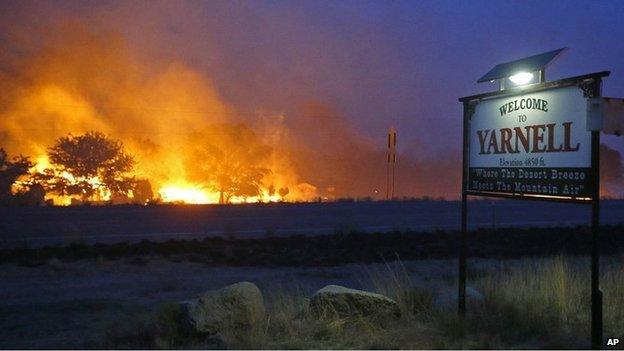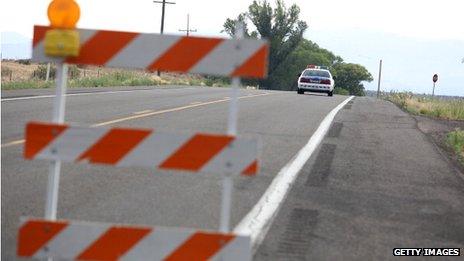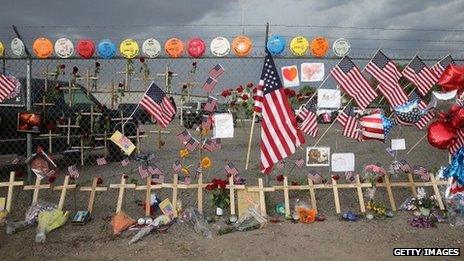Arizona wildfires: Heartbroken locals search for answers
- Published

Residents of Arizona have been mourning the 19 firefighters who were killed battling a ferocious wildfire last weekend. The Yarnell Hill Fire saw the biggest loss of firefighters' lives since the 9/11 attacks.
The road from Prescott to Yarnell would, in normal times, be a joy to drive along.
It winds through wooded hills, each turn offering a new vista, the slopes rich in pine and shrub, and the blue skies stretch away on a scale that, to European eyes, is spectacular.
I realise I risk sounding like a spokesman for the Arizona tourist board.
But this is genuinely charming country and as we made our way through it, it was easy to forget, for a moment, what had happened here, and why we had come.
Yarnell is the little town where a forest fire raged unchecked last Sunday and destroyed half of the houses.
One man who lived there, Pat Bernard, told me how he had moved his family out but then stayed a little longer himself.
With his mobile phone, he filmed what looked like the aftermath of a bombing.
Under a dark haze, dozens of buildings were alight. That was bad enough.
But what Pat did not know at the time was that firefighters, deployed nearby to create a fire break, found themselves at the mercy of a shifting wind.
What should have been a routine operation, of a type they had carried out at many other places, went horribly wrong and the fire they had come to stop overwhelmed them. Nineteen were killed.
Yarnell itself is closed now. The road towards it was so empty we wondered if we had got lost.
Mobile phone footage shows the scale of the fire's devastation
A small truck was coming the other way so we waved, and the driver stopped. He was a utility worker, his vehicle carrying equipment. He looked exhausted.
I first asked for directions. Just keep going, he said, and you will come to a police roadblock. He asked where we were from.
I have to admit that I did wonder whether we really had time to chat - we were in a hurry with deadlines to meet.
But the man seemed eager to talk and when I offered some comment about the terrible news he sighed, painfully.
He had just come from Yarnell and one of the dead men was the son of a friend of his. Tears welled up and ran down his cheek.
I suddenly felt guilty. I was in a rush but he was grieving.

The roadblock was the closest we could get to the fire, the closest we wanted to get, because even from several miles away, we could see a vast cloud of grey smoke rising into the air.
The unnerving thing was that while it usually blew to the north, advancing steadily in one direction, it would sometimes switch and burn the other way.
When our camerawoman Maxine Collins used her most powerful lens, she could pick out a menacing orange line of flame.
An emergency official confirmed that the fire was still out of control.
The disaster has led to a search for explanations - the heatwave, the months without rain, climate change, cuts to the budgets for fire prevention.
I walked into a forest just above Prescott. Twigs snapped underfoot, dry grass lay on baked earth, and the wind was gusting, first one way, then another.
I had heard the word tinderbox used here but only now did it make sense.
In Prescott, in a little park near the courthouse, I met Lorri Canley, an elderly woman out for a morning stroll.
She was heartbroken, she said, at the loss of so many lives.
That is what everyone has been saying here. But then Lorri said something that really struck me.
"Prescott is ringed by trees", she told me, "we live with the risk of fire." Prescott always has, with its history as a mining town and its streets of pretty wooden houses surrounded by an ocean of forest.
To lose 19 men at a stroke is devastating enough. But when they are the very people trained and dedicated to keeping the fires at bay, that is an altogether greater tragedy.
A mile away at fire station number seven, where the men were based, the fence is jammed with flowers and messages.

I watched a senior police officer march up with a sense of ceremony to plant a flag.
At the foot of the fence, 19 simple wooden crosses stand in a row.
A Harley Davidson roared up. The rider, in black leather, climbed off, removed his helmet, shook his pony tail free and then knelt down to touch the cross labelled Grant.
He had known Grant McKee since school, he said, shaking his head in sorrow. He climbed onto his bike but before he put his helmet back on, he reached up with the back of his hand to dry his cheeks.
How to listen to From Our Own Correspondent, external:
BBC Radio 4: Saturdays at 11:30 and some Thursdays at 11:00
Listen online or download the podcast.
BBC World Service: Short editions Monday-Friday - see World Service programme schedule.
You can follow the Magazine on Twitter, external and on Facebook, external